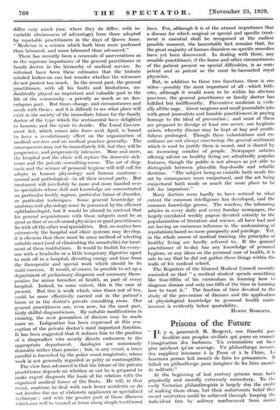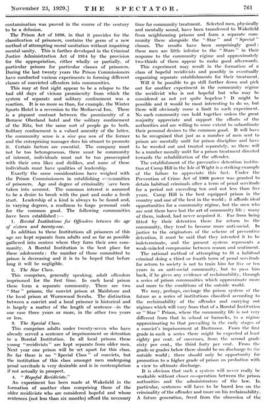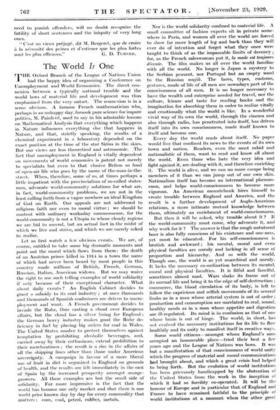Prisons of the Future
I L y a, poursuivit M. Bergcret, une ferocite par- . -11- ticuliere aux peuples civilises qui passe en cruaute l'imagination des barbares. Un criminaliste est bier plus- mechaut qu'un sauvage. Un philanthrope invente des supplices inconnus a la Perse et a la. Chine. Le bourreau persan fait: mourir de faim les prisonniers. Il fallait un philanthrope pour imaginer de les faire mourir de solitude."
. At the beginning of last century prisons were both physically and morally extremely unsanitary. To the early Victorian philanthropists is largely due the credit of making them clean, but their unfortunate belief. that moral sanitation could be achieved through keeping- the individual free by solitary confinement from moral contamination was proved in the course of the century to be a delusion.
The Prison Act of 1898, in that it provides for the classification of prisoners', contains the germ of a new method of attempting moral sanitation without impairing mental sanity. This is further developed in the Criminal Justice Administration Act of 1914 by the provision for the appropriation, either wholly or partially, of particular prisons for particular classes of prisoners. During the last twenty years the Prison Commissioners have conducted various experiments in forming different classes of convicted offenders into communities.
This may at first sight appear to be a relapse to the bad old days of vicious promiscuity from which the system of separate and solitary confinement was a reaction. It is no more so than, for example, the Winter Sports Hotel is a reversion to the Mediaeval Inn. There is a piquant contrast between the promiscuity of a Bernese Oberland hotel and the solitary confinement of the Ritz, but the same sort of people go to both. Solitary confinement is a valued amenity of the latter, the community sense is a sine qua nan of the former and the enterprising manager does his utmost to promote it. Certain factors are essential. The company must not be too heterogeneous, there must be community of interest, individuals must not be too preoccupied with their own likes and dislikes, and some of these individuals must have qualities of leadership.
Exactly the same considerations have weighed with the Prison Commissioners in establishing communities of prisoners. Age and degree of criminality !lave been taken into account. The common interest is assumed to be a desire to break with the past and make a fresh start. Leadership of a kind is always to be found and, in varying degrees, a readiness to forgo personal ends for the common good. The following communities have been established :— 1. Borstal Institutions for Offenders between the age of sixteen and twenty-one.
In addition to these Institutions all prisoners of this age are kept separate from adults and as far as possible gathered into centres where they form their own com- munity. A Borstal Institution is the best place for these adolescents : the number of those committed to prison is decreasing and it is to be hoped that before long it will be negligible.
2. The Star Class.
This comprises, generally speaking, adult offenders imprisoned for the first time. In each local prison these form a separate community. There are two " Star " prisons, the convict prison at Maidstone and the local prison at Wormwood Scrubs. The distinction between a convict and a local prisoner is historical and is largely a matter of the length of sentence—in the one case three years or more, in the other two years or less.
3. The Special Class.
This comprises adults under twenty-seven who have already served a sentence of imprisonment or detention in- a Borstal Institution. In all local prisons these young " recidivists " are kept separate from older men. Next year one prison will be set apart for this class. So far there is no " Special Class " of convicts, but the institution of this class amongst men undergoing penal servitude is very desirable and is in contemplation if not actually in prospect.
4. " Hopeful Recidivists."
An experiment has been made at Wakefield in the formation of another class comprising those of the older recidivists who are considered hopeful and whose sentences (not less than six months) afford the necessary time for community treatment. Selected men, physically and mentally sound, have been transferred to Wakefield from neighbouring prisons and form a separate com- munity there alongside the " Star " and " Special " classes. The results have been surprisingly goOd these men are little inferior to the " Stars " in their response to the community regime and approximately two-thirds of them appear to make good afterwards.
This experiment may result in the formation of a class of hopeful recidivists and possibly in eventually organizing separate establishments for their treatment.
Will it be possible to go still further down and pick out for another experiment in the community regime the recidivist who is not hopeful but who may be considered as not yet quite hopeless ? It might be possible and it would be most interesting to do so, but there will obviously come a limit to such experiment. No such community can hold together unless the great majority appreciate and support the efforts of the authorities and are willing to some extent to subordinate their personal desires to the common good. It will have to be recognized that just as a number of men sent to prison are mentally unfit for prison discipline and have to be weeded out and treated separately, so there will be a number morally unfit for a prison treatment directed towards the rehabilitation of the offender.
The establishment of the preventive detention institu- tion at Camp Hill in the Isle of Wight is a striking example of the failure to appreciate this fact. Under the Prevention of Crime Act of 1908 power was granted to detain habitual criminals after a term of penal servitude for a period not exceeding ten and not less than five years. Camp Hill is the best equipped prison in the country and one of the best in the world ; it affords ideal opportunities for a community regime, but the men who are sent there have lost the art of community life ; many of them, indeed, had never acquired it. Far from being fitted by their detention there for return to the community, they tend to become more anti-social. In justice to the originators of the scheme of preventive detention, it must be said that they intended it to be indeterminate, and the present system represents a weak-minded compromise between reason and sentiment.
The rational method of attempting to fit a habitual criminal doing a third or fourth term of penal servitude for return to society is not to train him for five or ten years in an anti-social community, but to pass him back, if he gives any evidence of reclaimability, through a series of prison communities which approximate more and more to the conditions of the outside world.
We may, perhaps, envisage the prison system of the future as a series of institutions classified according to the reclaimability of the offender and carrying out regimes which will vary from that of a Borstal Institution or " Star " Prison, where the community life is not very different from that in school or barracks, to a regime approximating to that prevailing in the early stages of a convict's imprisonment at Dartmoor. From the first grade in such a series there might be expected at least eighty per cent. of successes, from the second grade sixty per cent., the third forty per cent. From the grade or grades below there should be no discharge to the outside world ; there should only be opportunity ftir promotion to a higher grade of prison on probation with a view to ultimate discharge.
It is obvious that such a system will never really be workable without closer co-operation between the prison authorities and the administrators of the law. In particular, sentences will have to be based less on the criminality of the offender and more on his reclaimability: A future generation, freed from the obSession of the need to punish offenders,. will no doubt recognize the futility of short sentences and the iniquity of very long ones.
" C'est un vieux prejuge, dit M. Bergeret, que de croire al la necessite des peines et d'estimer que les plus fortes
































































 Previous page
Previous page